|
|
|
Sort Order |
|
|
|
Items / Page
|
|
|
|
|
|
|
| Srl | Item |
| 1 |
ID:
157478
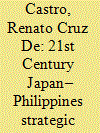

|
|
|
|
|
| Summary/Abstract |
The Philippines and Japan have evolved a security partnership in the face of China's maritime expansion in the South and East China Seas. The two countries pursue this security partnership through regular bilateral consultations among Philippine and Japanese heads of states, political leaders, defense ministry officials, and high-ranking military officers; joint naval exercises; and exploratory discussions for arms transfers and negotiations for a Status of Forces Agreement (SOFA) between Japan and the Philippines. Initially, Article 9 of Japan's 1947 Constitution hindered this security partnership. However, a recent reinterpretation of the pacifist constitution now allows Japan a collective self-defense “particularly to export arms to its allies and security partners and to deploy the JSDF overseas when necessary. Now, the challenge for Japan and the Philippines is to ensure the viability of their security partnership in the light of Philippine President Rodrigo Duterte's efforts to improve his country's relations with China.
|
|
|
|
|
|
|
|
|
|
|
|
|
|
|
|
| 2 |
ID:
074204
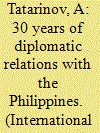

|
|
|
| 3 |
ID:
091891
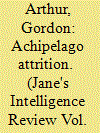

|
|
|
|
|
| Publication |
2009.
|
| Summary/Abstract |
The Islamist insurgent group, the Abu Sayyaf Group, has proven its ability to inflict significant losses on the Philippine military in recent attacks. Gorden Arthur examines the army's operations aimed at dismantling the rebel group and undermining its civilian support.
|
|
|
|
|
|
|
|
|
|
|
|
|
|
|
|
| 4 |
ID:
105177
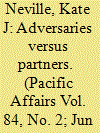

|
|
|
|
|
| Publication |
2011.
|
| Summary/Abstract |
n the Philippines, skepticism about private sector participation in urban water provision became increasingly pronounced as missed service targets and regulatory battles plagued governmental relations with the two companies (Manila Water and Maynilad) granted concessions for water provision in the capital, Manila. A comparative study of these two public-private partnerships (PPPs) reveals the challenges of reconciling bureaucratic and organizational dynamics with public suspicion of the private sector. This study draws on interviews and observations with corporate and government officials, academics, journalists, non-governmental organizations and civil society members in the Philippines, almost a decade after the initial privatization.
This paper furthers our understanding of the outcomes in Manila-and PPPs more generally-by addressing the tension between credible commitment in contractual arrangements and flexibility for responding to economic and environmental shocks. It argues that adversarial interactions between the private corporations and regulators hindered the collaborative negotiations needed to respond to the currency crisis. Fear of public backlash against price increases and contract adjustments prevented the government and companies from engaging in meaningful joint problem solving.
The differential outcomes of the companies illustrate the relevance of specific contractual arrangements and leadership in determining the impact of unforeseen shocks. However, the problems experienced by both companies indicates the need-if the private sector is to equitably and efficiently provide public goods-to redesign PPPs to increase transparency and to develop true partnerships.
|
|
|
|
|
|
|
|
|
|
|
|
|
|
|
|
| 5 |
ID:
164689
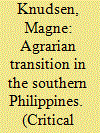

|
|
|
|
|
| Summary/Abstract |
On the southern Philippine island of Mindanao, scholars have documented a precarious land tenure, livelihood, and security situation for many smallholders. Agrarian political economy studies provide insightful analyses of the underlying causes of much poverty and violence on the island. Less attention has been given to cases of smallholder success. This article proposes that conditions for smallholder farming, even among ethnic minority groups, are more varied across the island than the literature suggests. In upland villages of north-central Mindanao, agrarian transition is a multi-directional process that produces different outcomes among households, kin groups, and villages. The main case study is a thriving mixed swidden and fixed field Maranao-Muslim farming village. Almost all the households in the village have successfully claimed land as their own and diversified and improved their livelihoods in recent times. To explain these positive outcomes, the article uses a relational approach and draws on anthropological literature on kinship, land tenure, and place to assess the bargaining power of smallholders in land deals. A stronger cross-fertilization of key insights in agrarian political economy and anthropological literature on kinship enriches the debate on agrarian transition in the southern Philippines.
|
|
|
|
|
|
|
|
|
|
|
|
|
|
|
|
| 6 |
ID:
080905
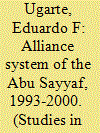

|
|
|
|
|
| Publication |
2008.
|
| Summary/Abstract |
Unsettled conditions on Jolo and Basilan islands in the southwestern Philippines have seriously hampered efforts to obtain information about the Abu Sayyaf. The result has been a continuing ignorance over the most fundamental features of the group. In the attempt to broaden our understanding of its structure, this article examines data drawn from an array of sources in light of the authoritative work of Thomas Kiefer on the traditional Tausug alliance system on Jolo. It argues that the Abu Sayyaf consists of a system of alliance groups of the kind customarily found in Muslim Filipino societies
|
|
|
|
|
|
|
|
|
|
|
|
|
|
|
|
| 7 |
ID:
175540


|
|
|
|
|
| Summary/Abstract |
This article explores the social and moral implications of Duterte's war on drugs in a poor, urban neighbourhood in Manila, the Philippines. Drawing on long-term ethnographic fieldwork, surveys, and human rights interventions, the article sheds light on policing practices, social relations, and moral discourses by examining central perspectives of the state police implementing the drug war, of local policing actors engaging with informal policing structures, and of residents dealing with everyday insecurities. It argues that the drug war has produced a climate of ambiguous fear on the ground, which has reconfigured and destabilised social relations between residents and the state as well as among residents. Furthermore, this has led to a number of subordinate moral discourses — centred on social justice, family, and religion — with divergent perceptions on the drug war and the extent to which violence is deemed legitimate.
|
|
|
|
|
|
|
|
|
|
|
|
|
|
|
|
| 8 |
ID:
063906
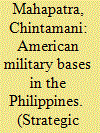

|
|
|
| 9 |
ID:
110797
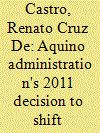

|
|
|
|
|
| Publication |
2012.
|
| Summary/Abstract |
This article examines how the South China Sea dispute impacts on the Aquino
administration's 2011 decision to shift the focus of the Armed Forces of the
Philippines (AFP) from internal security to territorial defense. Upon assuming
office in 2010, President Benigno Aquino announced his intention to modernize
the AFP, to buttress the country's territorial defense, and to check China's
aggressive assertion of its sovereignty over the South China Sea. However, the
lack of financial support from the Philippine Congress prevented the immediate
implementation of the plan. The March 2, 2011 incident between a Philippine
survey ship and two Chinese patrol boats at Reed Bank, however, prompted the
Aquino administration to redirect the country's security focus. The incident also
triggered a strong clamor from the military and other government institutions for
the allocation of resources to the development of the AFP's territorial defense
capabilities. China's heavy-handed behavior in the South China Sea, as well as its
uncompromising diplomatic posturing, further convinced the Aquino administration
of the inevitability of facing China militarily in the near future. Coincidentally,
the United States supports the Philippines' shift to territorial/maritime defense
and pledges to provide its ally with affordable military hardware. In conclusion, the
article observes that the convergence of strategic and diplomatic events-an offshoot
of the March 2 Reed Bank incident-finally made the Aquino administration and
the AFP take the first step in the long and arduous process of building a modest
military capability for territorial defense.
|
|
|
|
|
|
|
|
|
|
|
|
|
|
|
|
| 10 |
ID:
149530
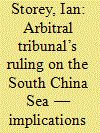

|
|
|
|
|
| Summary/Abstract |
Three and a half years after the Philippines took the unprecedented step of challenging the legal basis of China’s expansive maritime claims in the South China Sea, the Arbitral Tribunal established under compulsory dispute resolution provisions contained in the United Nations Convention on the Law of the Sea (UNCLOS), and based at the Permanent Court of Arbitration in The Hague, issued its final ruling on 12 July 2016.
|
|
|
|
|
|
|
|
|
|
|
|
|
|
|
|
| 11 |
ID:
146116
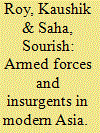

|
|
|
|
|
| Edition |
South Asia ed.
|
| Publication |
Oxon, Routledge, 2016.
|
| Description |
xii, 246p.: mapshbk
|
| Standard Number |
9781138210431
|
|
|
|
|
|
|
|
|
|
|
|
Copies: C:1/I:0,R:0,Q:0
Circulation
| Accession# | Call# | Current Location | Status | Policy | Location |
| 058724 | 355.0218/ROY 058724 | Main | On Shelf | General | |
|
|
|
|
| 12 |
ID:
122908
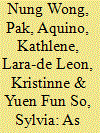

|
|
|
|
|
| Publication |
2013.
|
| Summary/Abstract |
In recent years, transnational Chinese investors from the Greater China region have been seeking natural and mineral resources in foreign countries. This paper focuses on a mineral-rich region in the Philippines where China's resource-led diplomacy was first launched in 2007. Although foreign Chinese mining companies have made inroads into mineral-rich local communities, they have also encountered resistance from non-state actors, causing their operations to be disrupted and suspended. The authors argue that the local reception of China's resource-led diplomacy can be attributed to two factors. First, in light of the debate on 'China's globalization versus South East Asian state sovereignty', the growing strength of the Philippine state in resisting transnational mining endeavours hinges on the democratic space constituted by both state and non-state actors, resulting from political decentralization and active social activism. Second, it shows that the transnational Chinese actors have an insufficient knowledge base, in which they privilege a top-down state-centric approach that reinforces the patrimonial rule of the Philippine politicians. The authors conclude, first, that such patrimonial rule is largely made possible through the provincial governor as the key agent connecting the national state authority, local government units, mining operators/investors and the affected villagers. Second, local resistance to resource-led patrimonial rule hinges on the formation of Philippine democratic space. This space remains transient and unpredictable in nature, and so cannot be assimilated into the patrimonial character of the Philippine state. Such democratic struggle is like wind, thunder and lightning - hard to chase, hard to catch.
|
|
|
|
|
|
|
|
|
|
|
|
|
|
|
|
| 13 |
ID:
140611


|
|
|
|
|
| Summary/Abstract |
The motivations for the birth of ASEAN were so that its members’ governing elite could concentrate on nation building, the common fear of communism, reduced faith in or mistrust of external powers in the 1960s, and a desire for economic development. In the international political scenario, the ASEAN is the successor of ASA (Association of Southeast Asia) which was formed in 1961. It consisted of a group of countries including Philippines, Malaysia, and Thailand.
|
|
|
|
|
|
|
|
|
|
|
|
|
|
|
|
| 14 |
ID:
130178
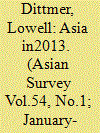

|
|
|
|
|
| Publication |
2014.
|
| Summary/Abstract |
Asia in 2013 Was Above all a year of ironies, a year of prosperity and growth accompanied by nationalist pensions an dressing dissatisfaction. It was also rebuilding year following a year of major transitions. Characteristically the targetofgreatnaturaldisasters,duringtheyearTyphoonHaiyanafflicted 6,000 fatalities on the Philippines while Sumatra's widen fire haze(the biggest in 15 years) be fogged Singaporean Malaysia. Yet, amid all these disconcerting changes, Asians s could take comfort in certain continuities.
|
|
|
|
|
|
|
|
|
|
|
|
|
|
|
|
| 15 |
ID:
125207


|
|
|
|
|
| Publication |
2013.
|
| Summary/Abstract |
President Obama's post-election visit to Asia last November was a vivid reminder that America is in the process of making a strategic pivot east. That Burma was one of his destinations was good for many reasons, one of which was to remind the development community that this country is once again full of potential, as it was half a century ago. Indeed, in the 1960s Burma, along with the Philippines and Sri Lanka (then Ceylon), was seen as one of the most likely candidates in Asia to follow Japan into sustained economic growth. The fact that neither Burma nor Ceylon nor the Philippines ever quite made it-indeed, for different reasons, each became an also-ran in terms of development-is an interesting story in its own right, but a topical one too. After years of frustrated hopes and dashed expectations, each of these countries, surprisingly, has another chance to fulfill its long-stalled potential. Development delayed, it seems, is not necessarily development lost.
|
|
|
|
|
|
|
|
|
|
|
|
|
|
|
|
| 16 |
ID:
173415
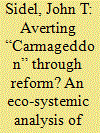

|
|
|
|
|
| Summary/Abstract |
This article provides a holistic analysis of traffic congestion in Metro Manila, treating traffic and transport in the Philippines’ national capital region as an ecosystem which has entrenched itself, endured, and evolved in the face of ongoing demographic, economic, and technological change. The article focuses on the activities and initiatives of a new “species” within Metro Manila’s transport ecosystem – the transport reform advocacy group – to identify and examine both the constituent elements and complex operations of the ecosystem and its capacities for resistance, resilience, and reconstitution in the face of reforms. These reform initiatives include a proposed bus rapid transit (BRT) system, the loosening of number coding restrictions on public utility vehicles, the liberalization of point-to-point (P2P) bus services, the legalization of motorcycle taxis, the Public Utility Vehicle Modernization Program (PUVMP), the establishment of bicycle lanes, and the expansion and improvement of pedestrian walkways to improve micro-mobility in the metropolis. The article concludes with a consideration of the efforts of transport reform advocacy groups to advance these elements of their reform agenda amidst the ongoing global pandemic and the government-imposed quarantine and economic downturn in the Philippines in early-mid 2020.
|
|
|
|
|
|
|
|
|
|
|
|
|
|
|
|
| 17 |
ID:
157287
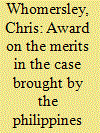

|
|
|
|
|
| Summary/Abstract |
The Tribunal constituted under UNCLOS in the proceedings brought by the Philippines against China has now rendered its Award on the Merits. This prompts two questions. First, does the Award strengthen the doubts which have been expressed about whether the Tribunal ought to have taken jurisdiction over the case? And second how cogent is the reasoning of the Tribunal on the substantive issues raised by the Philippines? This paper aims to explore both of these questions.
|
|
|
|
|
|
|
|
|
|
|
|
|
|
|
|
| 18 |
ID:
182423
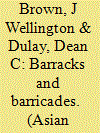

|
|
|
|
|
| Summary/Abstract |
This paper presents a theory of foreign military basing as a function of the degree of internal threat facing a host nation. The theory is based on rational choice logic where politicians balance economic and security benefits against sovereignty and legitimacy costs. When internal threat is low a host nation’s political actors value legitimacy and sovereignty and hence reduce base access. When internal threat is high economic and security benefits trump legitimacy and sovereignty costs, hence increasing base access. The theory is assessed through process-tracing the historical events around U.S military basing in the Philippines. When internal threat was low from coups and revolutionary movements the Philippine government reduced U.S. basing access, but when a threat from these movements was high they either maintained or increased access. This study suggests more carefully considering the role of internal threats when assessing the dynamics of foreign basing.
|
|
|
|
|
|
|
|
|
|
|
|
|
|
|
|
| 19 |
ID:
137927


|
|
|
|
|
| Summary/Abstract |
Over the past decade, growing numbers of young Filipinas have entered Denmark on the au pair scheme. While its official aim is to broaden the cultural horizons of youth, researchers generally view Filipina au pairing as a form of labour migration using au pairs as inexpensive domestic workers. This article argues that, despite this critique, au pairing does play an important formative role for young Filipinas because it opens up for experiences abroad that enable them to be recognised as independent adults in Philippine society. Rather than autonomy, however, au pairs define their independence in terms of their capacity to assume responsibility for others, thereby achieving a position of social respect. Based on ethnographic fieldwork in Denmark and the Philippines, this article explores how young Filipinas use the social, economic, and cultural resources they gain from their au pair stay abroad to re-position themselves vis-à-vis family and friends at home.
|
|
|
|
|
|
|
|
|
|
|
|
|
|
|
|
| 20 |
ID:
146493
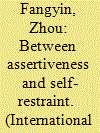

|
|
|
|
|
| Contents |
Since 2010, there has been obvious escalation of tensions in the South China Sea, coinciding with China's rise and the United States’ ‘pivot’ to Asia. Has China become more aggressive in its approach to the South China Sea? What strategic goal is China is pursuing in this area? Where does the South China Sea rank in China's overall foreign policy agenda? This article addresses these issues from the Chinese perspective. In the first part, the article discusses China's changing strategy and the leadership's thinking behind the changes. In the second part, it examines in detail several incidents involving China in the South China Sea, including confrontations with the Philippines over Scarborough Shoal and the Second Thomas Shoal and China's more recent land reclamation. The article argues that China's strategic goal in the South China Sea is a relatively modest one. The South China Sea disputes do not rank particularly highly among China's strategic priorities. To a great extent the handling of these issues is also subject to the dynamics of the overall relationship between China and the Association of Southeast Asian Nations (ASEAN).
|
|
|
|
|
|
|
|
|
|
|
|
|
|
|
|
|
|
|
|
|